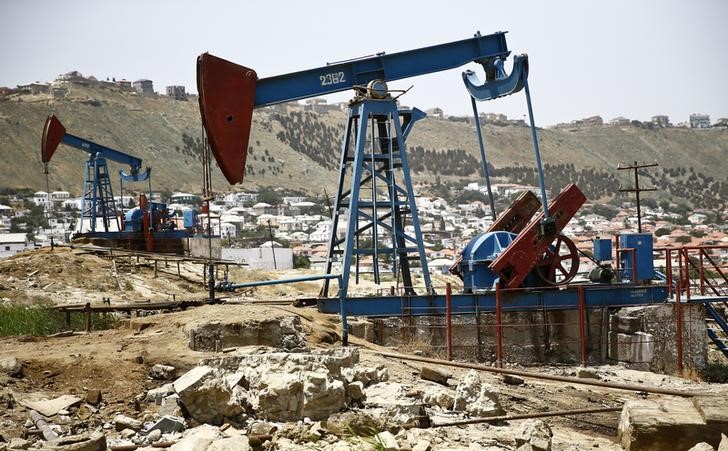(Bloomberg) -- OPEC+ left oil consumers in limbo, sticking to its plan of monthly production increases until July but refusing to give any hints about further moves until there’s clear evidence more crude is needed.
“The demand picture has shown clear signs of improvement,” Saudi Energy Minister Prince Abdulaziz bin Salman said, in some of his most upbeat comments since the price crash last year. But pressed on whether more supply increases will be needed, he said: “I will believe it when I see it.”
The wait-and-see approach indicates that OPEC+ is likely to err on the side of caution, potentially responding too late if the energy market tightens rapidly, as OPEC itself is forecasting. The risk for the broader economy is faster inflation just as it’s recovering from the pandemic.
Hours before oil producers gathered virtually, the International Energy Agency warned of a looming gap between rising demand and stagnant supply in the second half of the year, putting upward pressure on prices.
“Demand growth is outpacing supply gains even with the agreed month-by-month OPEC+ production increases taken into account,” said Ann-Louise Hittle, oil analyst at consultant Wood Mackenzie Ltd.
The IEA, which advises Western countries on energy policy, forecast that global oil demand will jump roughly 5 million barrels a day -- the equivalent of the production of Kuwait and the United Arab Emirates -- between now and the end of the year.
With Brent crude rising above $70 a barrel on Tuesday, OPEC+ is now at the center of one of the most pressing debates in global markets: the threat of inflation. From the U.S. Federal Reserve to the People’s Bank of China, central bankers are starting to sweat about rising prices, particularly for commodities such as steel and lumber that later filter into the cost of everyday goods. Prince Abdulaziz said that Saudi Arabia, Russia and other oil producers weren’t to blame, with oil having a “minuscule” impact.
And yet, Western consumers are feeling the pinch. In America, average retail gasoline prices rose to a six-year high above $3 per gallon over the Memorial Day weekend, which traditionally marks the start of the summer driving season.
“This inflation issue is not going away,” said Bill Farren-Price, a director at research firm Enverus and veteran observer of the cartel. “If OPEC+ are smart they will start to worry about the risk of demand being eroded as oil gets into the $70s.”
For Prince Abdulaziz, the concern about inflation marks a welcome turn-around for the oil market, however. The veteran Saudi minister has spent the year leading an often unruly coalition of oil producing nations that cut production significantly and only recently has started to boost output in response to higher demand and rising prices. Rather than high oil prices, OPEC+ has been battling with ultra-low ones for most of 2020 and early 2021. At one point last year, West Texas Intermediate traded in negative territory, with producers having to pay consumers.
The experience of the last year has left deep scars within the coalition. And Saudi Arabia has reason to be cautious about the second half, with the outlook dependent on two hard-to-predict factors: the coronavirus and nuclear talks between Tehran and Washington.
While oil demand is improving in the Americas and Europe, the opposite is happening in Asia as the spread of new variants prompts lockdowns from India to Japan, Vietnam and Malaysia.
“Covid-19 is a persistent and unpredictable foe, and vicious mutations remain a threat,” OPEC Secretary-General Mohammad Barkindo said.
Atomic Diplomacy
The nuclear talks, which diplomats initially said were aiming for a deal by June, appear more complicated than anticipated. Iran and the U.S. will probably need more time to iron out their differences, with a deal potentially delayed until August.
“They’re going to wait and see what happens with Iran. If Iran does get delayed and if demand picks up as we expect, then OPEC will need to bring barrels back,” said Amrita Sen, chief oil analyst at consultant Energy Aspects.
Prince Abdulaziz is probably also waiting for the market to digest all the new oil that Saudi Arabia and the rest of the OPEC+ is adding. In May, the cartel added 600,000 barrels a day extra. This month it will increase another 700,000 barrels a day, and in July nearly 850,000 barrels more. The impact will only be felt later this summer.
But the wait-and-see approach presents a problem for consumers: refiners unsure of OPEC’s next moves may rush into the spot market before prices rise further. And as prices go higher, others refiners will do the same, creating a spiral. There are signs investors are already expecting that to happen.
©2021 Bloomberg L.P.
